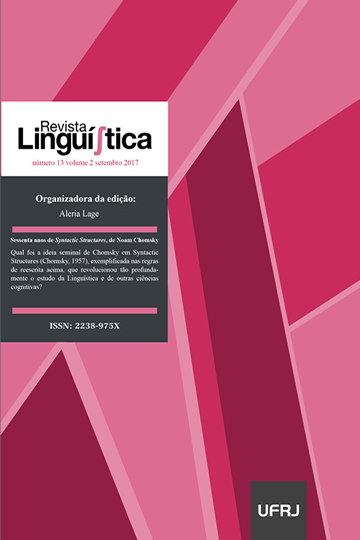Theory and experiment in Parametric Minimalism: the case of Romance Negation
DOI:
https://doi.org/10.31513/linguistica.2017.v13n2a13506Resumo
This paper has a double goal: frst, it lays down and refnes the basic hypotheses on the parametric structure of Romance negative systems that were originally introduced in my presentation at the Venice GLOW Workshop on Dialect Variation in 1987 (especially sections 3-9 and 11-13)3; then it further elaborates on them (sections 10 and 14-15), and revisits the conclusions (sections 16-22) in light of a more recent minimalist approach to the possible formats of parametric variation (the Principles & Schemata model, sketched in Longobardi 2005a). More generally, the theoretical focus of the article is on exploring how minimalist research on syntactic diversity could be conducted.
In the spirit of Borer (1984), the parameters of negation can be argued to be essentially encoded in the lexical entries of the sentential negation morpheme and of the negative determiners of each language. No space is left in this framework for such generic notions as (strict or non-strict) ‘negative concord' vs. ‘double negation' languages. In fact, these notions looked at best epiphenomenal and obsolete already in 1987: in spite of their continued use even in recent literature, they turn out to be both insuffcient and unnecessary, and are potentially misleading.
Now, a good deal of the negation parametrisation can be shown to have to do with the feature composition of lexical entries and to be actually nearly ‘perfect', in three minimalist senses: frst, given Boolean conditions on feature association, the parametric choices exhaust the set of logical possibilities, determining whether the values of such features may, must, or may not co-occur on one and the same (class of) item(s); second, all the parameters needed for crosslinguistic descriptive adequacy ft into independently attested and restrictive schemata; third, they are shaped by, or interact with, natural third-factor conditions (Chomsky 2005); fnally the parametrisation hypothesised is ‘complete' in the technical sense that all the typologically possible combinations of values turn out to be attested.
With respect to UG principles, I show how objections against the possible universality of conditions on covert long-distance dependencies, as established by Italian negative operators (Rizzi 1982, Longobardi 1991), can be successfully addressed and eventually dismissed. Furthermore, such conditions are argued to be fully structural principles rather than functional preferences.
---
DOI: http://dx.doi.org/10.31513/linguistica.2017.v13n2a13506
Downloads
Publicado
Edição
Seção
Licença
Autores que publicam na Revista Linguí∫tica concordam com os seguintes termos:
Os autores mantêm os direitos e cedem à revista o direito à primeira publicação, simultaneamente submetido a uma licença Creative Commons que permite o compartilhamento por terceiros com a devida menção ao autor e à primeira publicação pela Revista Linguí∫tica.
Os autores podem entrar em acordos contratuais adicionais e separados para a distribuição não exclusiva da versão publicada da obra (por exemplo, postá-la em um repositório institucional ou publicá-la em um livro), com o reconhecimento de sua publicação inicial na Revista Linguí∫tica.

A Revista Linguí∫tica é uma revista do Programa de Pós-Graduação em Linguística da UFRJ e se utiliza da Licença Creative Commons - Atribuição-NãoComercial 4.0 Internacional (CC-BY-NC)









